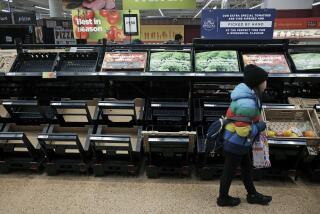Critics Say British Food Chains Have Appetite for Gouging
- Share via
LONDON — The new 44,000-square-foot Tesco of Kensington that opened in the heart of London this week is the sort of Los Angeles-style supermarket that Britons love to hate and hate to love.
Offering a deli, bakery, flower shop, takeout food store and cafe, as well as health and beauty supplies, financial services and, yes, groceries, this supermarket even comes with a color-coded store plan--a Thomas Guide for the shopping cart.
But while some Britons hail the joys of shopping for so many items under one roof, critics are crying “monopoly.”
England’s top four national food chains--ASDA, Safeway, Sainsbury’s and Tesco--have raised their market share from less than 30% to more than 45% in the past decade, at the expense of Mum-and-Pop shops.
British newspapers are accusing the supers of charging shoppers “some of the highest prices in the Western world,” as the Sunday Times of London recently put it.
The basket of groceries that cost about $145 at Sainsbury’s is priced at $35 less in France, $44 less in the United States and $53 less in the Netherlands, according to the newspaper.
Meanwhile, beleaguered farmers, who have seen the bottom fall out of their markets, are selling sheep for the cost of a bag of potato chips and claim that this is not reflected in the price of lamb chops at the likes of a Tesco.
Such complaints have prompted the government’s Office of Fair Trading to launch an inquiry into the power and profit margins of major supermarkets, the results of which are due out in December.
Supermarket chiefs say the big four have about the same market share as their counterparts in France and Germany; U.S. chains, which tend to be regional, cannot be compared in the same way.
Food retailers insist that the government will find the British consumer is well-served.
“There is an innate suspicion of size and success in Britain,” said Kevin Hawkins, spokesman for the British-owned Safeway. “There is always a fear of a conspiracy to do things that are not in the public interest, that the bigger you are, the more likely you are to form a cartel.”
Supermarkets buy in large quantities at lower prices than small shops can, he said, and pass the advantage on to customers. Neighborhood stores that Britons hold dear, by and large, are more expensive.
Shopping baskets can be “played around with” and made to reflect whatever the investigative reporter wants them to illustrate, Hawkins said.
Nearly half the merchandise that big supermarkets sell consists of their own brands, which cannot be compared exactly to a product in France or Germany, he argued.
Moreover, he and other retailers said, labor and property costs and exchange rates affect prices; profit margins and return on investment are about the same in Britain as in other European countries.
Hawkins blamed the public’s fears of price-fixing on “the Murdoch press,” newspapers such as the Sunday Times that are owned by media magnate Rupert Murdoch and that have done many stories during the past three months on the high price of food in Britain.
However, the Daily Telegraph and the Evening Standard, which are not owned by Murdoch, have run similar stories.
Volker Sommer, a University College London anthropologist, bought a cartload of groceries from Tesco in Cambridge and a similar cartload at a local grocer in Kassel, Germany, and found that the groceries in Britain cost 56% more.
Of the 34 items he purchased, “not a single item was cheaper in Britain,” he wrote in the Evening Standard. Not even those made in Britain, such as Scottish smoked salmon.
Shoppers are of two minds about supermarket shopping, as opposed to small shops on the high, or main, streets of their neighborhoods.
“My high street is overpriced, and you get better quality in the super,” said Amanda Bone, 25, shopping at Tesco with her baby daughter in the cart.
But Bone, who recently moved to London from the countryside, called the enormous store “excessive” and said she regretted that supermarkets were driving small shops out of business.
“I do use supers, so I guess I’m hypocritical,” she said. “But all of the food stores in my village have been turned into antique stops and [real] estate agents.”
More to Read
Sign up for Essential California
The most important California stories and recommendations in your inbox every morning.
You may occasionally receive promotional content from the Los Angeles Times.













